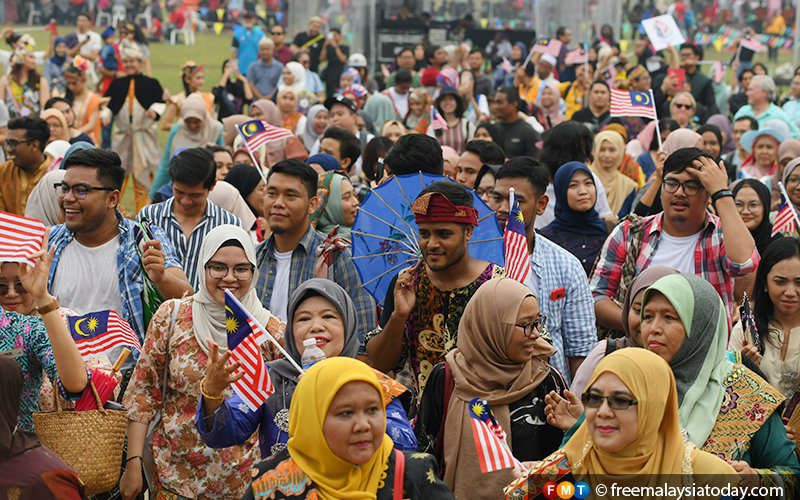Malaysia, truly unified?

If we live in a nation that propagates and promulgates only the majority’s culture, language and history, and selectively has “amnesia” about the contributions of second, third or fourth generation migrants towards building Malaysia, how can we then shape a cohesive nation?
Shankar R. Santhiram, Free Malaysia Today
The purpose behind the formation of Malaysia in 1963 was the principle of “Free through Unification”.
Today, we commemorate this event. I say commemorate instead of rejoice or celebrate because many of our fellow citizens in Sabah and Sarawak argue that they are not really “free” and simply exchanged one coloniser for another.
And can we blame them?
Clean water, consistent electricity supply, access to education and shelter are still precious commodities there, and not basic rights, and that after a whopping 58 years of independence.
Therefore, it isn’t surprising that some of our fellow Malaysians question the wisdom of their forefathers who accepted this deal for unification.
While there were definitive political, economic and social reasons for the formation of this new nation, ultimately, Malaysia was formed to bring prosperity and harmony to everyone.
Historically, the Malaysia that came into being on Sept 16, 1963 was a federation of many parts; and a remarkable act of political consolidation.
Initially, the political and community leaders of Sarawak and North Borneo (Sabah) were opposed to Malaysia as they wanted to seek independence first, in each of their respective territories.
Eventually, many of their leaders were won over by convincing arguments as to the benefits of the Federation of Malaysia.
This new state now had enormous political, economic and ethnic differences. Malaysia had to pull together and accommodate so many challenges to our aspiration to become a successful nation.
At one level, the continued existence of this nation has only happened because generations of Malaysians have bought in to the idea of “being Malaysian”.
When we go abroad, we refer to ourselves as “Malaysians” and not to the specific race we were born into. We gravitate to all things Malaysian.
As a student in the UK in the late 1980s and early 1990s, I made regular trips from Brighton to London with the sole aim of drinking ‘teh tarik’, eating ‘roti canai’ and reading recent copies of the newspapers at the iconic Malaysia Hall.
But being Malaysian is surely more than just a love for our smorgasbord of cuisines, and the occasional coming together when we win at a sporting event. These are the “lowest hanging fruits” and the easiest definition of our Malaysian identity.
At a deeper and more significant level, isn’t being a unified nation with a shared vision and common goals what actually shapes our identity?
But today, do we still share the same vision of 1963 – Free through Unification?
Nation-building involves a collective sense of national identity. This is solely built on a foundation that holds us together, like our shared culture, language, and history.
If we live in a nation that propagates and promulgates only the majority’s culture, language and history, and selectively has “amnesia” about the contributions of second, third or fourth generation migrants towards building Malaysia, how can we then shape a cohesive nation?
The recently published book “From Decolonization to Ethno-Nationalism: A Study of Malaysia’s School History Syllabuses and Textbooks, 1905-2020”, by Professor Santhiram Raman, shows that it took till the late 1970s for the history of Sabah and Sarawak to even be included in our school history textbooks.
His research further categorically demonstrates that from the mid-1980s onwards, history textbooks in Malaysia systematically leave out the contributions of the minority communities in the country.
Based on these simple facts alone, there is an abysmally small chance that future generations of Malaysians will truly have a shared vision of what building this nation was about, let alone common goals.
Building any nation relies on a united and inclusive society, supported by a good and clean government.
Ethnic segregation, stoking communal insecurities and religious fires, selectively and blatantly offering privileges to some citizens, and policies of affirmative action that have proven to benefit an elite few are completely detrimental and counter-intuitive for building a formidable, prosperous, united Malaysia.
Are you surprised that after 58 years, there are Malaysians on both sides of the South China Sea who still do not feel like they truly are equal citizens of this nation?
Where is the joint responsibility and common philosophy for a progressive country?
We seem to have an education system that simply serves to indoctrinate young people. In those progressive nations that we admire and laud, critical thinking people are nurtured.
Here, if you think critically and ask questions, you are almost immediately seen by some as a traitor of race and religion. We are a diverse nation, but matters like our culture or religiosity are still touted as sensitive and untouchable topics.
On top of this, how are we going to have a unified Malaysia when so many of our leaders continue to operate along racial lines? In fact, they spend an inordinate amount of time regurgitating the racial and religious narrative for their own political expediency and survival.
We have this rather catchy and upbeat jingle, promoted heavily by the ministry of tourism, “Malaysia Truly Asia”, which often resonates in my mind when I reflect about our nation.
When my wife and I see the visuals accompanying this jingle, which shows happy Malaysians congregating together, and welcoming foreigners warmly with their hands on their heart, we always jokingly promise each other that “one day, we will surely visit this beautiful country”.
Everything is branded to emphasise “unity in diversity”.
But in reality, it rings hollow and even sounds cynical, with all the underlying disparities between and within communities. These inequalities are not addressed, and we are only allowed to speak of them in hushed tones.
My nation is today 58 years old. When will we finally hum to the jingle “Malaysia Truly Unified”?

